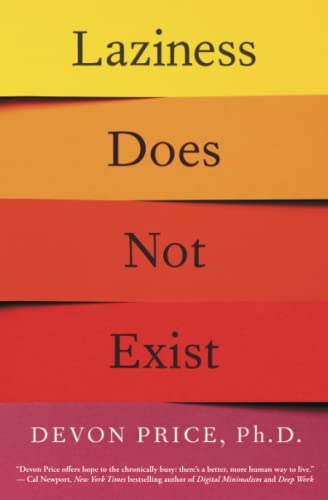Escape the Clutches of the Work-Obsessed World
Book review of Laziness Does Not Exist by Dr. Devon Price

Do you beat yourself up when you don’t accomplish as much as you want?
We don’t have endless time and energy, but it seems like we never do enough. We keep falling short of our goals. If people believe in us, that’s even worse, because we will fail them. It’s awful to feel like a letdown to others.
I definitely feel like I let others down. People put so much faith in me, yet I still can’t fulfill their high hopes and expectations. The more supportive my friends and family are, the guiltier I feel when I disappoint them.
Even when I overwork and get sick or injured, it seems like I should still put more effort into my work. It’s a grueling, ongoing rat race.
But what if there’s a way out of this race? What if it’s okay, even healthy and good, to not push yourself to excess, and still be valued and respected as a person?
This wonderful prospect is what Dr.
Devon Price explores in his book Laziness Does Not Exist.He doesn't just preach his ideas to us, either. He cites an abundance of research studies, and he interviewed many people from different backgrounds to support his points.
From all these interviews and research studies, the message is loud and clear: the culture of overwork, of judging people for being “lazy” if they’re not constantly working, is not just inhumane, it’s also counterproductive.
Overwork and Burnout
Price shows us so many cases of people who were extremely prolific and accomplished. But they pushed themselves too hard, rested too little, and eventually broke down with serious health issues, often destroying their relationships in the process.
To be clear, Price isn’t saying that it’s impossible to achieve great things without ruining your health and relationships. Rather, he is cautioning us from being too harsh on ourselves. We often work too long without a break, take on more responsibilities than we can manage, and try to produce at a speed that is unrealistic for our bodies.
In fact, I was stunned to see studies revealing that working 40 hours a week, which sounds like the North American norm, is too much for most people to sustain.
Price explains that the 40-hour workweek was based on former times. Most jobs back then were simple and mechanical factory jobs. But nowadays, many of our jobs require much more mental focus and complex thinking, so 40 hours is quite a strain.
When employees were allowed to work fewer hours in a week, however, they felt happier, healthier, and were more energetic and productive.
How Can We Create a More Balanced Life?
That said, what do we do when life saddles us with so many responsibilities? It’s all well and good to rail against the injustices of the system, and to learn to say no to extra favors and overtime at work. But what about things that are non-negotiable?
We still have to take care of our pets and kids, cook our meals, clean the house, work to pay the rent, and study for school. And what about maintaining our mental well-being with recreation and leisure, personal projects, and seeing our family and friends? How about making time for exercise and sleep?

Price’s premise is that at the end of the day, we need to be forgiving and kind to ourselves. We need to put our happiness and well-being above the social ideals of what we “should” do to be seen as good and worthy people.
For example, in his personal projects, Devon Price is passionate about activism. But even he had to cut down on the sheer amount of work he did for these causes, no matter how guilty he felt about disappointing others.
Price was ardent about keeping up with news articles as well. But he also had to cut back on his reading, because there is an overwhelming amount of information, and not enough time to reflect on what he read. Plus, all the news about atrocities and misfortunes, can be quite depressing and draining to see.
Devon Price suggests that we slow down our reading. Instead of rushing through a slurry of texts, we can think more deeply and critically about the articles we consume. And if the slew of negativity from the news gets too much, he recommends setting boundaries too. We could unfollow news outlets, and even mute friends who keep sharing such dark and dismal news articles.
That may sound harsh for those of us who believe in being compassionate and supportive of those in need. But if we are so burned out and overwhelmed, would we have the strength to be good and attentive listeners anyway?
Accepting Imperfections
Aside from easing down from our personal projects, Price urges us to be kinder to ourselves for being imperfect in our self-care and in our ability to care for others, too.
It’s okay to not maintain a spotlessly clean house. It’s fine to let daycare staff, babysitters, or relatives take care of your kids when you need a break. It’s all right to not be relentlessly devoted to your gym routine and miss a few sessions.

It’s not that we can’t have aspirations, but we can still cut ourselves some slack. Life is full of unexpected events and sudden stressors, so we can’t expect ourselves to have a flawless record, to be on top of things all the time!
For those of us who grew up with strict parents, it’s hard to accept the advice of letting go. We were expected to do our best at everything. There was no tolerance for slacking off whatsoever. It will take a while to unlearn this old mindset, so Devon Price encourages us to be patient, to be gentle with ourselves on our progress.
I want to clarify an important point: Price is not implying that by prioritizing our health over our ambitious goals, we would have the free license to do unethical and harmful things to others, such as cheating, fraud, and malpractice. Nothing excuses deeds that will hurt other people.
In fact, overworked people are more likely to give in to the temptation to take “shortcuts,” or to do other selfish things that will harm others.
For example, in the book, Peak Performance, Brad Stulberg and Steve Magness cite studies on burned-out athletes, workers, and students abusing illegal substances to get ahead.
Letting ourselves work at a more relaxed, humane pace, helps us perform better, feel more engaged, and resist the temptation to stray from our principles.
Minority Stress
Devon Price is a member of multiple minority groups—queer, trans, and autistic. From his and many other people’s experiences, he points out that if you have to deal with discrimination and oppression, it can be even more tiring to uphold social ideals and work so much.
So it was helpful to see minority groups in the book’s case examples. Many, if not most, of the people interviewed were gay, bi, or trans too, which I loved, since I’m gay and trans myself.
It was gratifying to see so much LGBTQ+ representation in this book, because most psychology books I’ve read, hardly mention queer or trans folks at all. If I’m lucky, a psych book might mention a few gay folks, but trans and nonbinary people would never be mentioned, unless the book was specifically about the LGBTQ+ community.
It’s wonderful to see a fellow trans person write such a beautiful, empowering book on mental health. I’m very thankful to have encountered Laziness Does Not Exist by Devon Price! I feel very inspired to change my life, to be kinder and more forgiving to myself when I’m not as productive as I want to be! I hope you will be more compassionate towards yourself too, and understand that you can live a happy, worthy life without drowning yourself in work obligations.
Originally published on The Book Cafe on Feb 15, 2022



